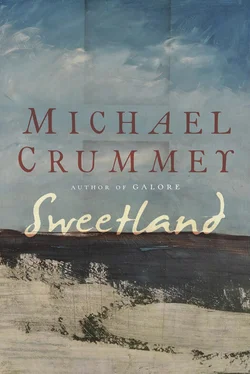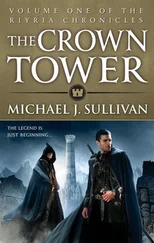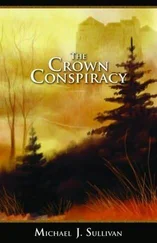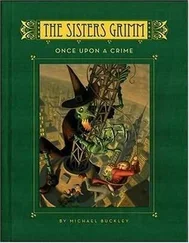He gave her a full forty-eight hours to dry before he turned her right side up. Pushed the boat back down the slipway and tied her to the dock. There was an old set of oars tucked in the shed rafters and he took those down and sanded and varnished them. He carved thole-pins by the light of the oil lamp and fashioned a bailer with the top half of a Javex bottle and then he went to bed, thinking the dory was probably at the bottom of the cove already. But she was riding high and more or less dry in the morning. He bailed out the bit of seepage before he untied her and set the oars. He hauled around the little cove two or three times, the dory moving like a cow in the water, low and heavy and awkward, and he was winded with the effort when he tied on twenty minutes later. But he had a boat to knock around in.
For two weeks in the middle of September he left the house in the dark each morning, walking to the north-end light to spare what was left of the two containers of gasoline. He spent the day out there harvesting potatoes and carrots and turnip, cabbage and onions, parsnip, storing the vegetables in the cool beside the cistern. Planning to ship the whole load to the cove on the quad and trailer when it was ready. The Coast Guard had sent a crew out earlier in the summer to sheet up the windows and doors of the house with plywood. Even the low door that led to the cistern was barred shut and marked with a DANGER — KEEP OUT sticker. Eight-inch screws placed every ten inches, Sweetland cursing each one as he torqued them free.
He got caught out there one afternoon in a pelting storm of wind and rain. He had wet gear in his pack but the rain fell in sudden steady waves and he was soaked to the skin before he so much as lifted his face. The keeper’s house was barred shut, the door to the old light tower padlocked, and he passed a wet night in the dank crawl space while the weather howled. He laid his slicker on the ground and huddled under one of the burlap sacks he’d brought for the potatoes, shivering awake every few minutes with the chill. Making a list of materials he planned to stash at the keeper’s house if he managed to live through the night — blankets, matches, a dry change of clothes. A tent, a barbecue. Homebrew, a side of beef. Duke’s barbershop. A duffle bag of sunshine.
He fell asleep as he added to his ludicrous list and he dreamt of Jesse rocking beside him with his arms around his knees, singing “The Cliffs of Baccalieu.” He woke in the black and reached for the boy, his hand closing around one bony knee. “Jesse,” he said, but the youngster carried on with his interminable ballad like Sweetland wasn’t present. He turned and grabbed Jesse by the arms, shaking the boy as he shouted his name, and he woke up in the teeming black alone. Sweetland felt around blindly, kicking his legs as far as they could reach, just to be sure nothing was in there with him. “Jesus fuck,” he whispered.
He listened to the marine forecast each morning after the gardens were put away and if the day looked fair he took his jigger and line down to the Love Boat to spend a few hours after his fall fish. He pulled around the breakwater into open ocean and went as far as Wester Shoals, forty-five minutes of rowing if the wind wasn’t blowing onshore. He let the boat drift on the shoal ground and ran his line overside until it touched bottom. He was never out of sight of land, and he kept an eye to the west’ard for signs of weather kicking up as he jigged the lead weight. The boat wouldn’t fare well in any kind of sea, he knew that. Most days he caught upward of ten to fifteen cod in the space of an hour or two and that was as long as he cared to be on the open Atlantic in Loveless’s craft.
He fried himself a meal of fresh cod, or made fish and brewis, or stewed the cod’s heads with potatoes. He cleaned and salted what he couldn’t eat fresh, stacking the fish in briny piles. It was a process he hadn’t been involved in since the advent of flash freezing in the fish plants, sometime before Hollis died, and he’d forgotten how to salt the fish properly. Done right, the kite-shaped slabs of meat would last till the End Times of Revelations. But it was a ticklish business that people spent a lifetime refining. Burnt was better than maggoty, he remembered that much, and he buried the snowy flesh in waves of salt until he started running shy and was forced to skimp.
He had his snares up on the mash, on runs in the bit of alder underbrush near Vatcher’s Meadow. He had two dozen laid along a mile or so, and he walked up to check the snares once he’d come in from fishing and had cleaned and put away the cod. If the weather was too dirty or uncertain to chance going out in the dory, he went first thing in the morning. He stripped and gutted the rabbits at the sink, boiled the carcasses until the flesh was falling off the bones. Bottled the meat and boiled the bottles to seal the covers tight. Stacked them in the pantry with his beets and relishes and jams and homebrew.
He went up to the mash early after the first night of frost in October, knowing the chill would have set the rabbits running to keep warm. He headed for an outcrop of bald stone at the south end of Vatcher’s Meadow where Glad’s sheep used to huddle out of the worst of the wind and rain, and he climbed beyond that to the straggle of alder and gorse where he’d set his snares. He could see the grey glove of a rabbit in the first slip as he approached and he shrugged an arm free of his pack, set it down behind him as he knelt to work the snare free of the furred neck.
The sun had come full into the sky. He had to shade his face beyond the brim of his hat and even so he had trouble picking out the details in front of him. He kept his eyes on the trees, watching for the next slip, and there was something amiss when he saw it, though the glare made it impossible to say what exactly. A rabbit in the snare, but it lay away from the cover of the bush. It looked to have been dragged to the wire’s limit, the standard hauled from the ground to put it on display in the open. He slowed as he came closer to it, glancing around as if there might be an audience watching to see his reaction.
Sweetland knelt beside it, leaning on his rifle. The rabbit was on its back with the legs splayed wide and the guts torn out, the stomach cavity empty. But there was nothing human about the mutilation — the animal’s head was still attached, the wire slip biting into the neck — and Sweetland let out a breath he didn’t know he’d been holding.
The eyes would be gone if it had been a crow or an eagle, Sweetland knew. A fox most likely, after the easy pickings.
“Now, Mr. Fox,” he said aloud.
He reached to clear the snare but his hands were shaking and it took a minute before they were steady enough to ignore. He stood holding the rabbit by the ears, trying to decide if it was worth his while bringing it home. “Now, Mr. Fox,” he said again. He underhanded the corpse into the bush and reset the slip before moving on.
None of the other snared animals were touched. But it was a regular feature of the line afterwards, to lose one or two rabbits to predation. Sweetland considered trying to trap the fox, or sitting out on the mash near a fresh kill and shooting the thing when it came nosing around. But he found himself feeling oddly disappointed the days there wasn’t a mutilated carcass in one of the snares. He’d never laid eyes on the fox he was feeding, but even the sign of the creature’s presence cheered him, as if it was a kind of conversation he was having with the animal. And he came to think of the fox as company on the island.
He walked an hour or more each evening, going out as far as the old incinerator to watch the horizon, to look in on the remains of Loveless’s calf petrifying in its metal tomb. He tapped the steel toe of his boot against the bell of the incinerator, to hear it ring hollow.
Читать дальше












